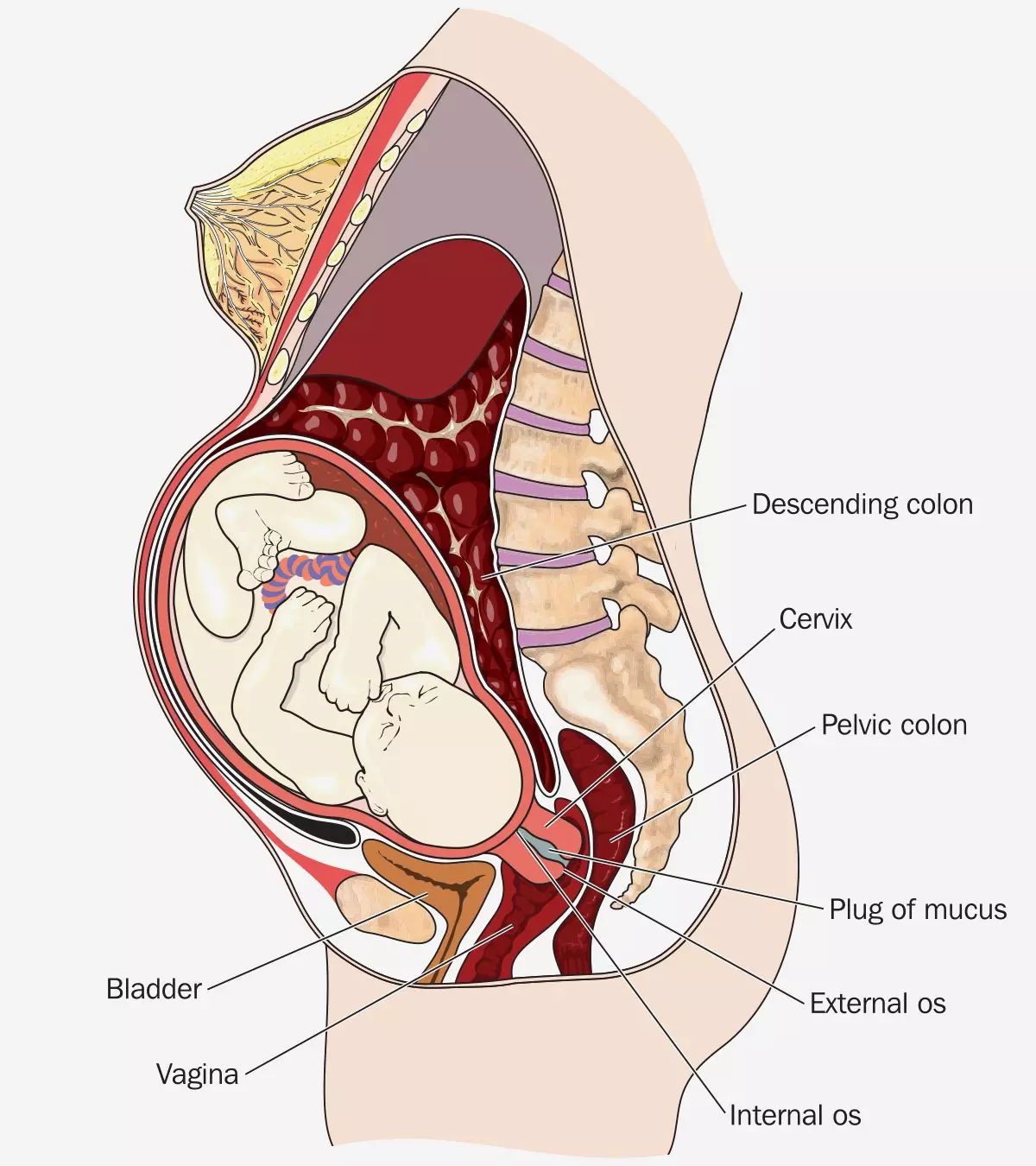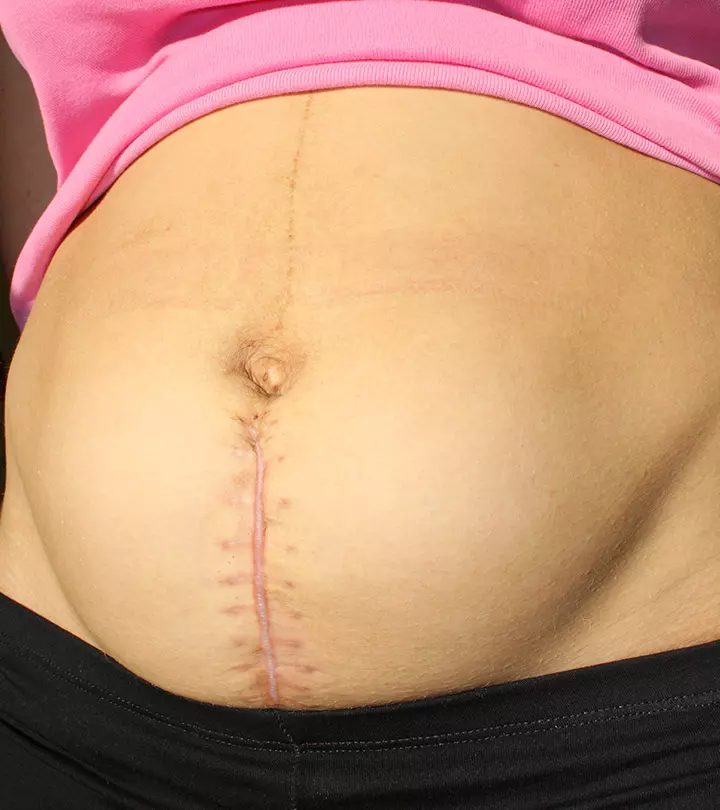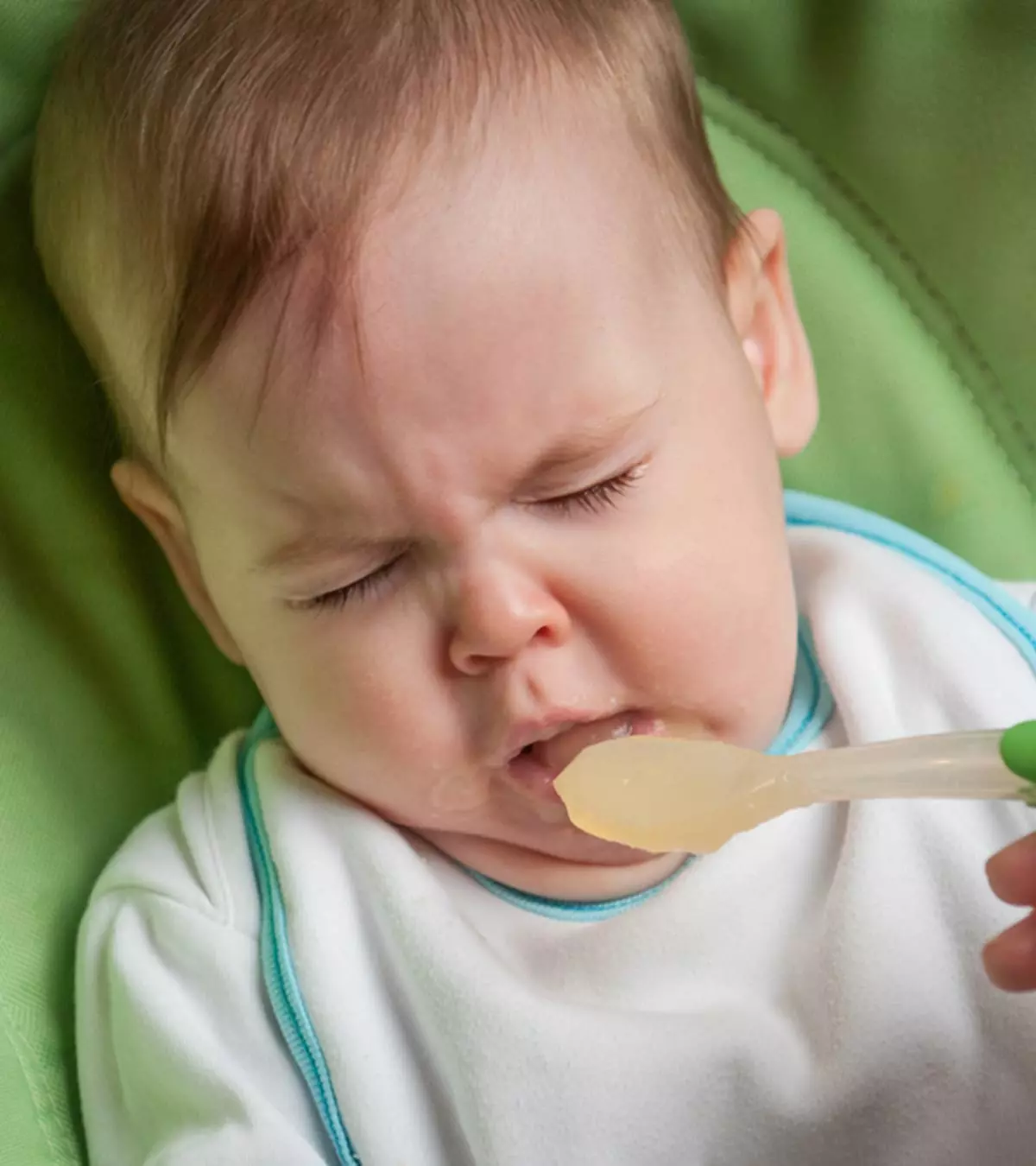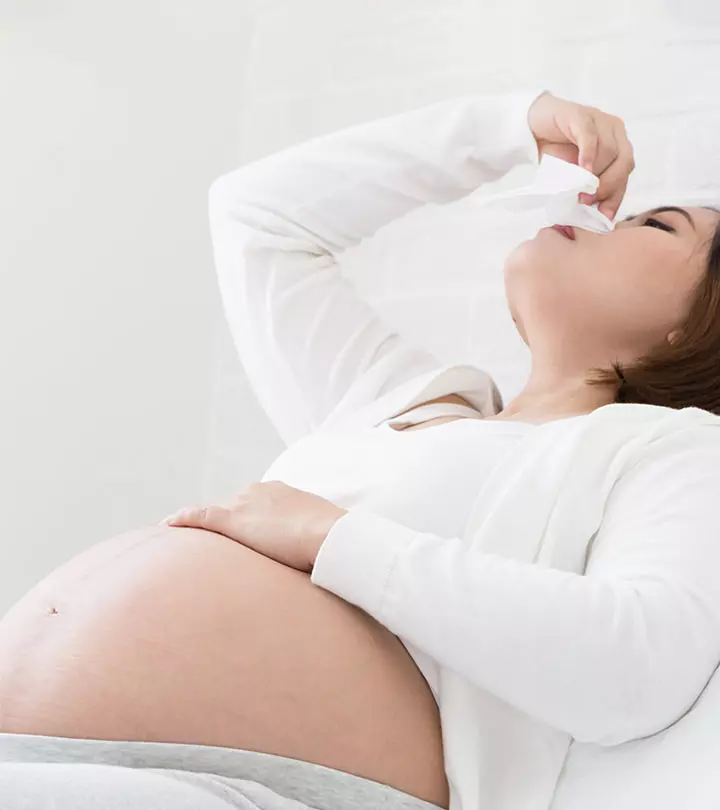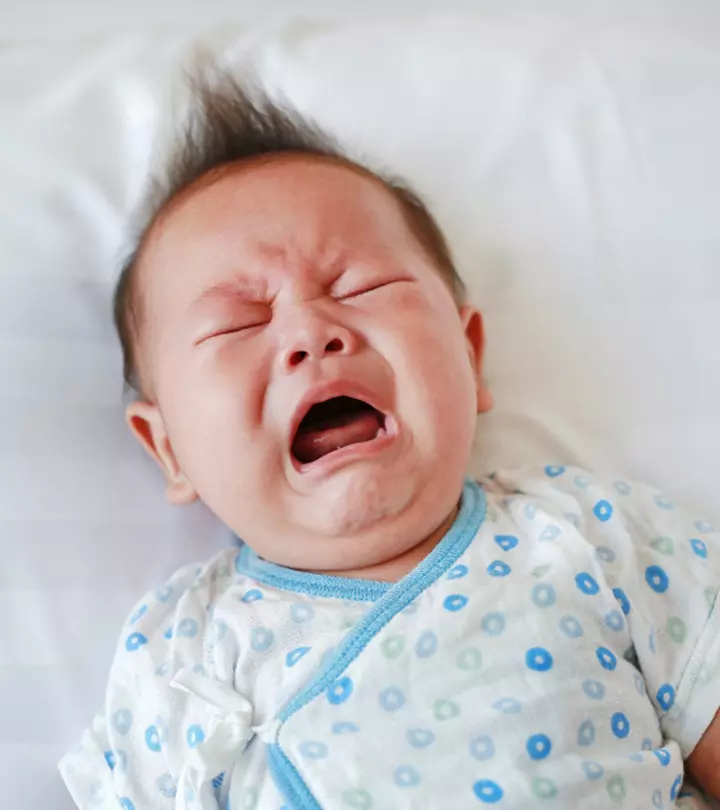
Image: Midjourney/ MomJunction Design Team
Body odor in babies is distinctive, and they may often smell of baby products or milk. However, babies who are not bathed on time or wear unclean clothes can have a sour or pungent odor. Most mothers could sense their babies smelling and try to keep them clean. Some babies can even leave a cake or fruity odor. On the other side, some may smell rotten fish or cabbage. You may seek medical care to determine the causes of unusual body smell in babies. Read on to know the causes, treatments, and remedies for various body odors in babies.
Key Pointers
- Body odor in babies is often not a sign of a serious problem.
- The odor is commonly caused by heat, dust, unhygienic surroundings, sweat, and urine.
- Preventive strategies for managing baby body odor include regular bathing, applying moisturizers or baby powders, and keeping them clean and dry.
- If a baby has an unusual smell such as fishy, fruity, or musky, they should be evaluated by a medical professional to rule out any underlying medical conditions.
Normal Body Odor In Babies

The following body odors are very common among babies, and you need not worry about them.
1. Milky odor
Babies often smell of milk. The peculiar body odor fades away when your baby’s milk intake reduces, and they graduate to a solid diet. Maintaining a balanced diet and good hygiene can help manage any odors caused by dietary changes or sweat.
2. Sour odor
Sometimes, your baby might have a sour body odor when they are spitting up or when dirt and sweat are trapped in their underarms, neck area, or skin folds. The lack of proper hygiene can lead to irritation, redness of the skin, and bacterial or fungal infection in babies.
 Quick fact
Quick factCommon Causes Of Body Odor In Babies

Some of the common causes of baby body odor may include (2):
- Pollution and heat
- Dust
- Dietary imbalance
- Dressing
- Wet clothing
- Unhygienic surroundings
- Sweat
- Urine MetaboliciA group of diseases that occur due to abnormal chemical reactions that affect how the body processes food disorders
Abnormal Body Odor In Babies
According to a report by the American Academy of Pediatrics, certain medical conditions can cause distinct odors from different parts of the body, including the breath, urine, skin, mucus, vomit, stool, or vaginal area (3). If your baby has a weird body odor, it may indicate an underlying health problem, such as a metabolic disorder. Some abnormal body odors in babies are the following.
1. Fish odor
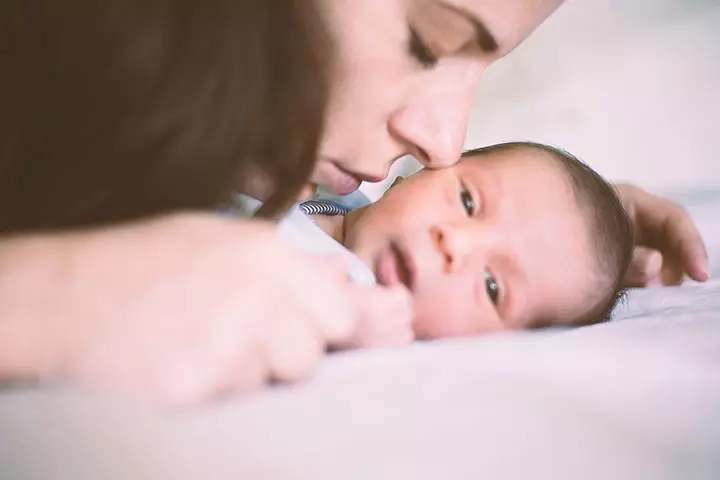
Babies with primary trimethylaminuria or fish odor syndrome (FOS) will have a rotten fish smell in their breath, urine, and sweat. This is a genetic disorder caused by an enzyme deficiency that prevents their body from breaking down trimethylamine (4).
Trimethylamine (TMA) is produced in the intestine when foods, such as eggs, legumes, some vegetables, fish, etc. are digested by colonic bacteria. TMA diffuses through the intestinal tract membrane and reaches the liver where it is metabolized into odorless trimethylamine oxide (TMAO).
Babies with hepatic diseases, such as viral hepatitisiLiver inflammation and damage caused by viral infections , may have rotting fish odor since TMA is not metabolized into TMAO in their liver. Kidney disorders may cause a fishy smell due to excessive bacterial growth in the intestine. Trimethylaminuria caused by hepatic or renal diseases is known as secondary trimethylaminuria (5).
Additionally, a case was reported of a 5-week-old infant diagnosed with trimethylaminuria (fish odor syndrome) linked to the choline content in infant formula. The baby displayed various physical symptoms. The report states, “On physical examination, temperature, heart rate, respiratory rate, and pulse oximetry were within normal limits. The child appeared well and alert. He sucked on his bottle, consuming 2 ounces of formula without emesis during the examination. Two small white papules (Epstein’s pearls) were noted on the palate. His breath smelled strongly of fish, and the odor filled the examination room. The remainder of the physical examination was unremarkable (6).”
2. Maple syrup odor
If your baby’s urine smells like maple syrup or cake, it can be because of maple syrup urine disease (MSUD). This is a rare genetic disorder due to the deficiency of an enzyme complex that breaks down certain amino acids (proteins) in the body. The accumulation of these amino acids and their toxic byproducts may give urine a distinct sweet smell. If left untreated, babies may develop neurological dysfunction and other neurological problems, such as seizures in babies (7). In addition to having sweet-smelling urine or earwax, children suffering from MSUD may experience other symptoms such as feeding issues, vomiting, irritability, lethargy, developmental delays, and muscle problems (8).
 Point to consider
Point to consider3. Musty odor
Phenylketonuria (PKU) is a congenital metabolic disorder that affects approximately 0.45 million individuals worldwide, as revealed by a study published in the American Journal of Human Genetics (10). This condition causes a musty odor to emanate from the body of affected babies. Babies with this genetic problem may have decreased metabolism of the amino acid called phenylalanine. If untreated, the accumulation of phenylalanine in the blood can lead to learning disabilities, behavioral problems, epilepsyiA central nervous system disorder characterized by unprovoked, recurrent seizures , lighter skin color, tremors, etc. (11).
4. Fruity odor
Fruity-smelling breath is one of the indicators of diabetes type 1iA chronic illness characterized by increased sugar in blood due to a destruction of the pancreatic cells in babies (12). The fruity scent occurs due to diabetes ketoacidosis (DKA), a complication of diabetes type 1 due to the buildup of ketones in the body. If left untreated, diabetic ketoacidosis can be life-threatening in babies (13).
5. Cabbage odor
Babies with tyrosinemia type 1 may have a cabbage-like odor. This is a genetic metabolic disorder where an enzyme deficiency causes the accumulation of the amino acid tyrosine in the blood. If left untreated, this may cause developmental delay in children and other fatal problems, such as liver failure and enlargement of the spleen (14). Other symptoms include yellowing of the skin and eyes (jaundice) and an increased tendency to bleed, especially from the nose (15).
6. Sweaty feet odor

Isovaleric acidemia and glutaric acidemia type II are disorders causing a “sweaty feet” smell in babies. Although it is rare, you may have to distinguish these conditions from excessive sweating of the feet that itself results in the odor.
- Isovaleric acidemia is a rare disorder caused by an inability to break down isovaleric acid. Its buildup results in sweaty feet odor and other symptoms, such as lethargy, failure to thrive, seizures, etc (16).
- Glutaric acidemia type II (GA2) is an inherited disorder that interferes with the metabolism of fats and proteins in the body. This may result in sweaty feet odor in babies. The symptoms may vary depending on the severity of the disorder. GA2 could lead to lethargy, poor feeding, behavioral changes, and vomiting. The most severe form of the disorder is seen within the first four weeks after the birth, and the baby may have brain malformations, and heart and liver enlargement (17).
If you notice any of these or other strange smells, call your child’s doctor for advice. Keep in mind that most of these conditions are rare, and there could be another explanation for the smell. Unpleasant body odor due to poor hygiene alone can be dealt with improved personal hygiene.
Ways To Deal With Your Baby’s Body Odor
Here are a few baby skin care steps you can take if your baby has body odor:
- Bathe the baby using baby shampoos
- Always pat dry and apply moisturizer after bath
- Use baby powders to reduce sweating. Ensure that the baby doesn’t inhale any of the powder.
- Use waterproof baby feeding aprons while feeding

- Follow nursing hygiene and clean the baby’s face and neck after eating
- Dress up your baby in light clothing during summer to avoid excess sweating
- Always use clean and dry socks and shoes
- Wash your baby’s clothes with a mild baby laundry detergent and dry them well
- Change diapers on time
- Use baby wipes or wash and pat dry the genital area while changing diapers
- Choose lightweight cotton bedding and sleepwear to keep air flowing and prevent overheating at night.
- Keep the nursery cool and well-ventilated by monitoring temperature and humidity.
- When using a baby carrier or car seat, take regular breaks to allow airflow and reduce sweat buildup.
Frequently Asked Questions
1. What kind of soap should I bathe my baby with to prevent body odor?
The usual Baby soaps and washes are suitable for bathing your baby. Some antibacterial baby soaps are available, but using them under medical supervision is better. Do not use harsh and scented soaps and perfumed lotions to prevent body odor, as they may harm your baby’s delicate skin.
2. How often should I bathe my baby to prevent body odor?
Babies need not bathe every day, and two to three times per week is considered enough. However, you may bathe your baby daily with special attention to skin folds to prevent body odor (18).
3. Is it safe to use deodorant on my baby to prevent body odor?
Deodorants may contain chemicals that may not be suitable for your baby’s delicate skin.
4. At what age do babies develop sweat glands?
A board-certified pediatrician from Santa Rosa, California, Dr. Pierrette Mimi Poinsett, explains, “There are two kinds of sweat glands, eccrine and apocrine. Both develop while the baby is in the womb. Eccrine glands are all over the body and are functional soon after birth. Apocrine glands are functional with the onset of puberty from about eight to 13 years in girls and nine to 14 years in boys.”
Body odor in babies is a natural occurrence that disappears as they grow. But if your baby smells different from the distinctive milky or sour odor, it may be due to an underlying condition. Typical body odor in babies is generally due to their diet, sweat, or dressing. If your baby presents uncommon smells such as fishy odor or fruity odor, do not panic. Instead, you may try some effective hygiene practices for managing the odor. However, consult a doctor if the odor doesn’t disappear for early detection of any issue and timely treatment.
Infographic: Do Newborn Hygiene Practices Reduce Unpleasant Body Odors?
Babies usually have pleasant body odor. Babies’ unpleasant body odor, including foot odor, may indicate an underlying condition or poor hygiene practices. Go through the infographic to learn newborn hygiene measures to avoid unpleasant body odors.

Illustration: Momjunction Design Team
Illustration: How To Deal With Body Odor In Babies?

Image: Dall·E/MomJunction Design Team
References
- Ilona Croy et.al; (2017); Babies Smell Wonderful to Their Parents Teenagers Do Not: an Exploratory Questionnaire Study on Children’s Age and Personal Odor Ratings in a Polish Sample.
https://pmc.ncbi.nlm.nih.gov/articles/PMC5574933/ - Body Odor.
https://my.clevelandclinic.org/health/symptoms/17865-body-odor - Odor (Unusual Urine and Body).
https://publications.aap.org/pediatriccare/book/348/chapter-abstract/5774398/Odor-Unusual-Urine-and-Body-Chapter-180?redirectedFrom=fulltext - Trimethylaminuria (’fish odour syndrome’).
https://www.nhs.uk/conditions/trimethylaminuria/ - Jeffrey Messenger et.al; (2013); A Review of Trimethylaminuria: (Fish Odor Syndrome).
https://pmc.ncbi.nlm.nih.gov/articles/PMC3848652/#:~:text=Trimethylaminuria%2C%20or%20fish%20odor%20syndrome%2C%20sweat%2C%20and%20expired%20air. - Ricci S. Pardini And Robert E. Sapien; (2003); Trimethylaminuria (fish odor syndrome) related to the choline concentration of infant formula.
https://journals.lww.com/pec-online/citation/2003/04000/trimethylaminuria__fish_odor_syndrome__related_to.10.aspx - Maple Syrup Urine Disease.
https://rarediseases.org/rare-diseases/maple-syrup-urine-disease/ - Maple Syrup Urine Disease.
https://kidshealth.org/en/parents/msud.html - Maple Syrup Urine Disease.
https://www.babysfirsttest.org/newborn-screening/conditions/maple-syrup-urine-disease-msud - Alicia Hillert et.al; (2020); The Genetic Landscape and Epidemiology of Phenylketonuria.
https://pmc.ncbi.nlm.nih.gov/articles/PMC7413859/ - Phenylketonuria.
https://www.nhs.uk/conditions/phenylketonuria/ - Spotting the Signs of Type 1 Diabetes.
https://www.choa.org/parent-resources/diabetes/signs-of-type-1-diabetes - Ketones and diabetic ketoacidosis (DKA).
https://www.breakthrought1d.org/news-and-updates/ketones-diabetic-ketoacidosis/ - Tyrosinemia Type 1.
https://rarediseases.org/rare-diseases/tyrosinemia-type-1/ - Tyrosinemia.
https://medlineplus.gov/genetics/condition/tyrosinemia/ - Isovaleric acidemia.
https://medlineplus.gov/genetics/condition/isovaleric-acidemia/// - Multiple acyl-coa dehydrogenase deficiency.
https://rarediseases.info.nih.gov/diseases/6523/glutaric-acidemia-type-ii - Washing your baby.
https://www.pregnancybirthbaby.org.au/washing-your-baby
Community Experiences
Join the conversation and become a part of our nurturing community! Share your stories, experiences, and insights to connect with fellow parents.
Read full bio of Dr. Richard Mario Lurshay
- Dr. Pierrette Mimi Poinsett is a licensed pediatrician and a health advocate with 19 years of experience. She completed her doctor of medicine from the University of Chicago Pritzker School of Medicine and is currently practicing as a medical consultant in California.
 Dr. Pierrette Mimi Poinsett is a licensed pediatrician and a health advocate with 19 years of experience. She completed her doctor of medicine from the University of Chicago Pritzker School of Medicine and is currently practicing as a medical consultant in California.
Dr. Pierrette Mimi Poinsett is a licensed pediatrician and a health advocate with 19 years of experience. She completed her doctor of medicine from the University of Chicago Pritzker School of Medicine and is currently practicing as a medical consultant in California.
Read full bio of Dr Bisny T. Joseph
Read full bio of Rohit Garoo
Read full bio of Shinta Liz Sunny





